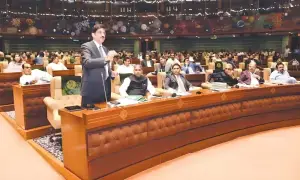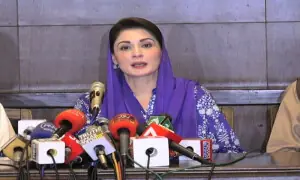At COP27, PM stresses joint efforts to support climate-hit developing countries
5 min readSHARM EL-SHEIKH, Egypt: Prime Minister Shehbaz Sharif on Tuesday stressed that climate change impacts had provided an opportunity to the global community to cease upon and chart a course to secure its future and support the vulnerable communities in the countries like Pakistan.
Addressing a high-level segment of COP 27, titled “Climate Change and Sustainability of Vulnerable Communities” the prime minister underlined the need for collective efforts, sharing of resources and technology with the vulnerable countries like Pakistan which had braced the worst devastation caused by climate induced floods.
The roundtable was co-chaired by the prime minister with his Norwegian counterpart Jonas Gahr Store.
The prime minister stressed that they should put their resources together with collective efforts to ward off impacts of the climate change.
The task was herculean but they must address the climate change impacts with shared responsibility and by enhancing the capacity and supporting the developing countries like Pakistan to rapidly address the issue.
Noting that addressing climate change would require a collective approach to help the most vulnerable countries, the prime minister laid emphasis on the significance of climate finance as integral to inclusive, adaptive and resilient recovery in the climate devastated Global South.
He also called for simplified, long-term climate financing instruments to plug capacity deficits in developing countries.
The prime minister said that during the recent devastating flooding, Pakistan suffered huge damages and according to estimates, these losses stood more than $30 billion.
Millions of houses and standing crops spreading over more than 4 million acres of land had been washed away.
It was one of the six high level roundtables organized by the Egyptian Presidency as part of the Climate Summit. The event was attended by several world leaders as well as representatives of UN System entities and International Financial Institutions.
The prime minister said that climate change was the defining issue of our times, which necessitated urgent and well calibrated response from the international community.
He stressed that the burden of climate action must be shared equitably rather than equally, without compromising economic growth and development of the developing countries.
The prime minister observed that Pakistan had been among those countries in the globe, that contributed to less than 1 per cent of global greenhouse gas emissions.
The climate change had ravaged the country, he said, adding it was very important for the world to realize that no more countries could become victims of this climate induced changes.
The prime minister briefed the participants about the massive devastation caused by the recent climate-induced floods, which had impacted over 33 million people in Pakistan, half of which were women and children.
He recounted that roads infrastructure had been damaged in Pakistan with hundreds of bridge and flyovers washed away.
The prime minister further stressed that it was now a high time for this august assembly to consider the action plan and save any country to become victim of this climate change.
Sharing the details of the Post-disaster Needs Assessment, he stated that public debt, rising international energy prices, and no real access to adaptation resources, among other factors, were the key challenges which impeded Pakistan’s recovery and rehabilitation efforts.
He invited the international community to join in Pakistan’s efforts towards climate resilient recovery.
He elaborated that the country was still going through phase of rehabilitation and reconstruction, while the stagnant flood water posed a danger to the health of thousands of children and their parents as the flood-hit population was suffering from serious diseases like malaria and dysentery.
Sharing his deep concerns over the impacts of climate change, the prime minister said that it must not happen again, it was their collective responsibility for the future and they must realize their responsibilities.
The prime minister also acknowledged the support provided by the world community and the friendly countries to the flood affected population of Pakistan.
He mentioned that they had been redirecting the foreign donations and the local resources for the relief, rehabilitation and reconstruction efforts.
The prime minister highlighted his government’s efforts to provide relief to the flood-hit populace through the social security network of Benazir Income Support Programme (BISP) and with which they immediately transferred cash amounts to the affected population.
Later, in his concluding remarks at the session, the prime minister said that developing countries like Pakistan had been suffering immensely due to natural calamities and that they had limited resources to overcome the challenges.
He said the developing countries were also short of resources to meet the basic requirement of a huge portion of the population.
He said Pakistan had established the bodies like National Disaster Management Authority and similar provincial bodies but the country was in dire need of resources for their empowerment to enable them to meet the challenges.
He emphasized the development of a robust mechanism to support the developing countries and that the debt-burdened states would not be in a position to cope with a situation similar to the one caused by the climate change-induced floods in Pakistan.
The prime minister reiterated his call for an urgent need for an early warning system as part of the preparedness against natural calamities.
He told the international gathering that following the flash floods, Pakistan was facing difficulty to meet its basic needs like wheat, palm oil and other agricultural products.
The prime minister urged the international community to come forward with “solid solutions” to support vulnerable communities and empower them to enhance their capacity enabling them to overcome climate change-induced disasters.
For the latest news, follow us on Twitter @Aaj_Urdu. We are also on Facebook, Instagram and YouTube.























Comments are closed on this story.